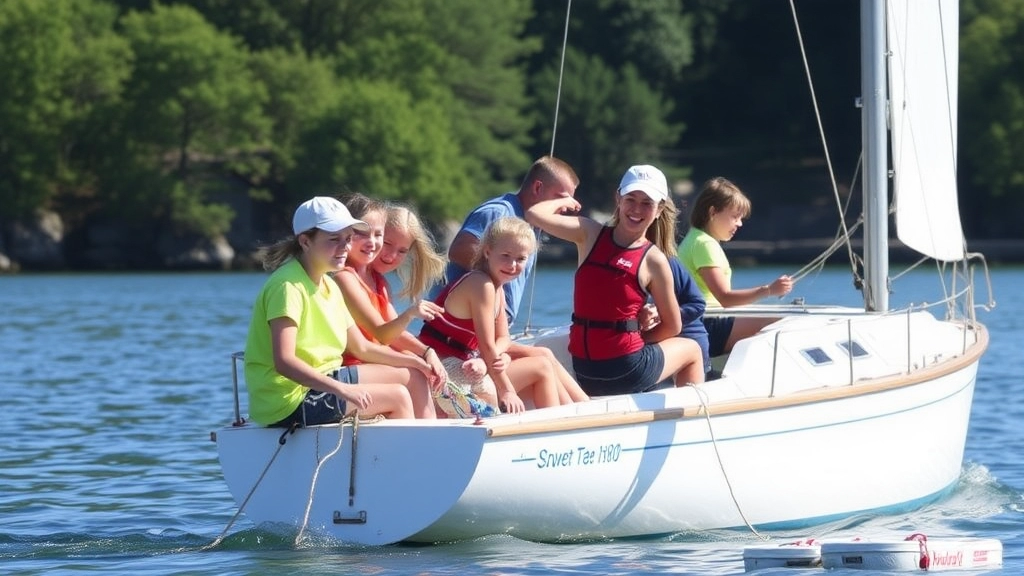Looking for an Unforgettable Adventure This Summer?
A Summer Sailing Camp might be just what you need. These camps offer a unique blend of fun and education, catering to various age groups and skill levels. Whether you’re a novice looking to learn the basics or an experienced sailor aiming to refine your skills, there’s something for everyone.
Explore the Camps
From exploring different types of camps to understanding the daily activities and educational components, this guide will help you navigate the sea of options.
Discover the Benefits
- Safety Measures: Learn about the precautions taken to ensure a safe sailing experience.
- Additional Activities: Enjoy activities like scuba diving and watersports.
Ready to set sail? Let’s dive into what makes a Summer Sailing Camp the perfect summer experience.
Types of Summer Sailing Camps
Ever thought about sending your kid to a summer sailing camp but got lost in the sea of options? You’re not alone. Let’s break it down so you can make a smart choice.
Day Camps vs. Overnight Camps
Day Camps:
- Perfect for younger kids or those new to sailing.
- Daily drop-off and pick-up.
- Local waters â no far-off adventures, but great for learning the basics.
- Shorter sessions â typically a week long.
Overnight Camps:
- Ideal for older kids and teens who want a deeper dive into sailing.
- Staying on-site â think bunk beds, campfires, and new friends.
- Extended sessions â from a week to a whole month.
- Exploration â sailing to different locations, maybe even a regatta or two.
Skill-Based Camps
Beginner Camps:
- Start from scratch â no prior experience needed.
- Focus on basics â rigging, knots, and basic sailing techniques.
- Safety first â lots of supervision and hands-on guidance.
Intermediate Camps:
- For those with some experience â maybe a summer or two under their belt.
- Advanced techniques â tacking, jibing, and understanding wind patterns.
- More independence â kids get to sail solo or in small groups.
Advanced Camps:
- Seasoned sailors only â think competitive sailing.
- High-intensity training â racing strategies, advanced navigation.
- Certification programs â earn badges or even official sailing certifications.
Specialty Camps
Racing Camps:
- Focus on speed and competition.
- Learn racing rules and tactics.
- Participate in regattas â real competitions to test their skills.
Adventure Camps:
- Sailing meets exploration.
- Multi-day trips â sail to different islands or coastal towns.
- Mix of activities â not just sailing, but also hiking, swimming, and more.
Marine Biology Camps:
- Blend of sailing and science.
- Hands-on learning â study marine life, ecosystems, and conservation.
- Perfect for budding marine biologists.
Real Stories, Real Choices
Take it from me â my nephew went from a day camp newbie to an overnight camp pro in just a couple of summers. He started with the basics and now he’s talking about competing in races. It’s all about finding the right fit for your kid’s interests and skill level.
So, what’s holding you back? Whether it’s a day camp close to home or an adventure camp that takes them to new horizons, there’s a perfect summer sailing camp out there. Dive in and find the one that will make this summer unforgettable for your child.
For more tips on preparing for summer camps, check out our Summer Camp Packing List for Counselors. If you’re looking for camps with specific themes, our guide on Creative Summer Camp Names might inspire you.
Age Groups and Eligibility

Ever wondered if your kid is the right age for a summer sailing camp?
Let’s dive into it.
Who Can Join?
Sailing camps usually cater to a wide range of age groups.
From the little ones to the teens, there’s a spot for everyone.
But, you need to know the specifics.
Age Brackets
Kids (7-12 years):
- Perfect for beginners.
- Focus on basic sailing skills and fun activities.
Teens (13-17 years):
- More advanced lessons.
- Opportunities for leadership roles.
Why Age Matters
Different age groups mean different learning styles.
Younger kids need more hands-on guidance.
Teens crave independence and challenge.
Eligibility Criteria
It’s not just about age.
Most camps have a few more boxes to tick:
- Swimming Skills: Basic swimming ability is a must.
- Medical Clearance: A quick check-up to ensure they’re fit for activities.
- Parental Consent: Yep, you need to sign some forms.
Stories from the Deck
I remember a mum asking if her 8-year-old was too young for sailing.
Guess what?
That kid ended up leading his group by the end of the camp.
So, don’t underestimate the power of starting young.
Quick Tips
- Check the Camp’s Website: They usually have detailed eligibility criteria.
- Talk to Other Parents: Get insights from those who’ve been there.
- Visit the Camp: If possible, a quick tour can make a world of difference.
Locations and Sailing Environments
Alright, let’s talk about where you can actually find these summer sailing camps and what kind of sailing environments you’ll be dealing with. I know you’re probably wondering, “Where’s the best place for my kid to learn sailing?” or “What kind of water conditions are safe and fun?” Let’s dive in.
Popular Locations for Summer Sailing Camps
Coastal Areas: Most sailing camps are located along the coastlines. Think places like California, Florida, or the Mediterranean. Why? Because these areas offer vast open waters and consistent wind conditions, perfect for sailing.
Lakes and Reservoirs: If you’re not near the coast, don’t sweat it. Many camps are set up on large lakes and reservoirs. These spots are great for beginners because the water is usually calmer, and there’s less chance of running into big waves or strong currents.
Rivers and Canals: Some camps even utilise rivers and canals. These environments can be a bit more challenging due to the narrow waterways and potential for stronger currents, but they’re great for teaching navigation skills.
Types of Sailing Environments
Open Water: This is where the real adventure happens. Open water sailing camps offer the thrill of navigating the vast ocean or large lakes. It’s perfect for older kids or teens who already have some sailing experience and are looking to level up.
Protected Bays: These are ideal for beginners. Bays offer a controlled environment with calmer waters and less wind, making it easier to learn the basics without the added stress of rough conditions.
Inland Waters: Think lakes and reservoirs again. These are usually more predictable and safer, making them excellent for younger kids or those just starting out.
What to Consider When Choosing a Location
Proximity: How far are you willing to travel? Sometimes the best camp might be a bit further away, but the experience could be worth the journey.
Water Conditions: Are the waters calm or choppy? This can significantly impact the learning experience, especially for beginners.
Weather: Consistent weather is crucial for sailing. You don’t want a camp that’s constantly battling storms or dealing with no wind at all.
Local Attractions: Some camps are located near interesting landmarks or cities. This can be a bonus if you’re planning to turn the camp experience into a family vacation.
Real Stories and Examples
I remember chatting with a parent who sent their 12-year-old to a sailing camp in the Florida Keys. They were initially worried about hurricanes and rough seas. But guess what? The camp was in a protected bay, and the instructors were seasoned pros who knew exactly how to handle the local weather. By the end of the camp, their kid was not only a competent sailor but also had a newfound love for marine biology thanks to the local coral reefs.
Skill Levels and Certification Programs
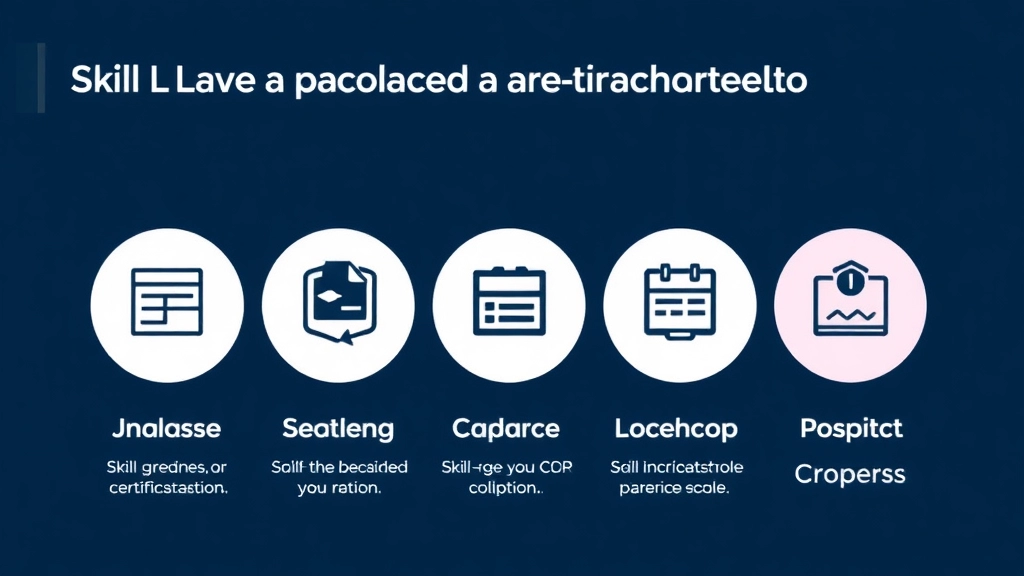
So, you’re thinking about summer sailing camps, right?
But you’re probably wondering: “What if my kid’s a total newbie?” or “What if they’re already a mini pro?”
Don’t worry, mate, these camps have got everyone covered.
Different Skill Levels
Beginner to Advanced
Whether your kid’s never set foot on a boat or they’re practically born with a sail in hand, there’s a camp for them.
- Beginners: Learning the basics. Think tying knots, basic sailing terms, and how to handle a boat.
- Intermediate: Time to level up. More advanced sailing techniques, navigation skills, and maybe even a bit of racing.
- Advanced: For the seasoned sailors. These guys get into competitive sailing, advanced navigation, and fine-tuning their skills.
Certification Programs
Now, let’s talk about certifications.
Because, let’s face it, having a certificate feels pretty cool.
Plus, it can come in handy down the line.
Royal Yachting Association (RYA)
One of the big names in sailing certifications. Camps often offer RYA courses, which are recognised globally.
- RYA Start Sailing: Perfect for beginners. It’s all about getting comfortable on the water.
- RYA Competent Crew: For those who’ve got the basics down. They learn to be a valuable crew member.
- RYA Day Skipper: For the more advanced. They take charge of the boat and learn to navigate.
US Sailing Certifications
If you’re across the pond, US Sailing offers a similar structure.
- Basic Keelboat: Starting point for beginners.
- Cruising Courses: For those looking to take longer trips.
- Racing Courses: For the competitive spirits.
Why Certifications Matter
You might be thinking, “Do we really need a certificate?”
Here’s the deal:
- Confidence: Your kid knows they’ve got the skills.
- Recognition: It’s proof of their abilities.
- Opportunities: Opens doors for future sailing adventures or even careers.
Real Stories
Take my mate Tom, for instance.
He started as a complete novice.
By the end of camp, he had his RYA Start Sailing certificate.
Now, he’s hooked and planning his next sailing adventure.
Daily Camp Activities and Itineraries
Alright, let’s dive into what you’re really curious about: Daily Camp Activities and Itineraries at summer sailing camps. If you’re wondering what your kids will be up to all day, I’ve got you covered.
What Does a Typical Day Look Like?
A day at a summer sailing camp is packed with exciting and educational activities. Here’s a breakdown of a typical day:
Morning Routine:
- Breakfast: Fuel up with a hearty breakfast because, trust me, they’ll need the energy.
- Morning Briefing: A quick rundown of the day’s activities, weather conditions, and safety reminders.
On the Water:
- Sailing Lessons: This is where the magic happens. Kids get hands-on experience with sailing techniques, from hoisting sails to mastering the tiller.
- Practical Sessions: Time to put theory into practice. They’ll be navigating their boats, learning to tack, and understanding wind patterns.
Lunch Break:
- Picnic Style: Usually on the beach or on the boat, keeping it casual and fun.
Afternoon Adventures:
- Regattas and Races: Friendly competitions to test their skills and boost their confidence.
- Exploration: Depending on the camp location, they might explore nearby islands or hidden coves.
Educational Workshops:
- Marine Biology: Learn about the local marine life. Think of it as a mini National Geographic experience.
- Navigation Skills: Basics of reading charts, using a compass, and understanding tides and currents.
Evening Wind Down:
- Dinner: Often a communal affair, fostering camaraderie.
- Campfire Stories: Sharing the day’s adventures, some laughs, and maybe a few ghost stories.
- Free Time: Games, stargazing, or just chilling out.
Real Talk: What Keeps It Engaging?
Variety and Balance:
- Mix of Learning and Fun: It’s not all about sailing. They’ll enjoy a mix of educational and recreational activities.
- Hands-On Experience: Kids learn best by doing. Real sailing, real navigation, real fun.
Stories from the Deck:
Example: I remember one camper who was terrified of capsizing. By the end of the week, they were leading their team in a regatta. That’s the kind of transformation these camps aim for.
Educational Aspects: Marine Biology and Navigation
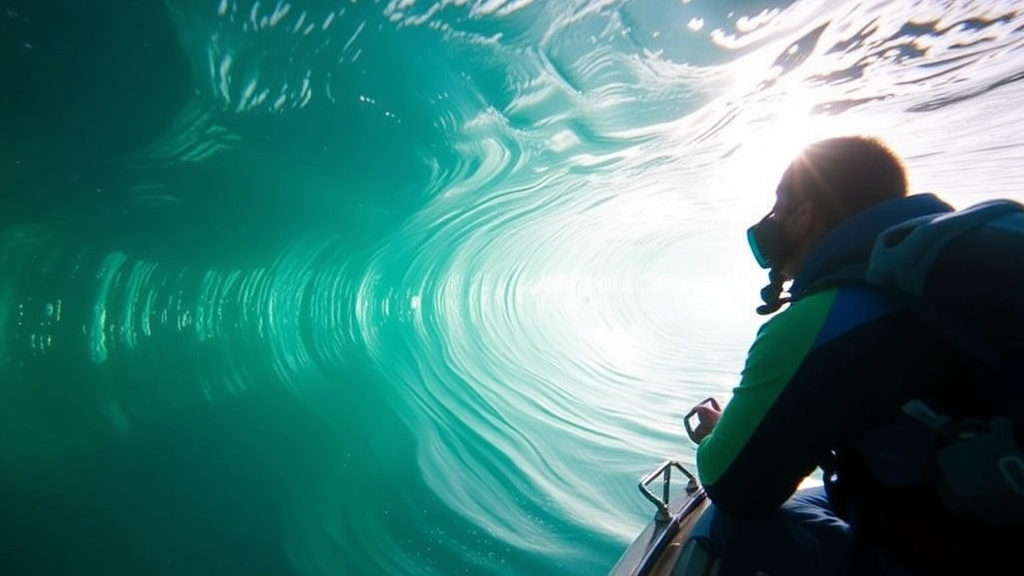
Ever wondered what your kids are really learning at summer sailing camps?
Sure, they’re out on the water, but are they picking up anything useful?
Marine Biology and Navigation are two key educational aspects that make these camps more than just a fun time.
What’s the Deal with Marine Biology?
Kids love the ocean, right?
But do they know what’s beneath the surface?
Marine biology at sailing camps isn’t just about staring at fish.
It’s about understanding ecosystems, marine life, and how everything’s connected.
Here’s what they’ll dive into:
- Identifying Marine Species: From starfish to dolphins, they’ll learn to spot and name them.
- Ecosystem Dynamics: How do coral reefs work? Why are they important?
- Conservation: Real talk on why plastic is bad and how they can make a difference.
Imagine your kid coming home and telling you about the different types of seaweed they saw.
Pretty cool, right?
Navigating the High Seas
Now, let’s talk navigation.
You think it’s just about steering a boat?
Think again.
Navigation is a mix of science, art, and a bit of magic.
Here’s what they’ll master:
- Reading Charts: Not just looking at maps, but understanding them.
- Using a Compass: Old school but gold school.
- GPS and Modern Tech: Because we live in the 21st century.
- Weather Patterns: How to read the sky and predict the weather.
This isn’t just for budding sailors.
It’s about life skills.
Why It Matters
These educational aspects make your kids smarter, more aware, and way cooler.
They get to:
- Boost Critical Thinking: By solving real-life problems.
- Learn Responsibility: Taking care of the environment.
- Gain Confidence: Mastering new skills.
Real Stories, Real Impact
Take Jamie, for instance.
He joined a summer sailing camp last year.
He came back talking about phytoplankton and how they produce oxygen.
He even taught his classmates a thing or two.
Additional Activities: Scuba Diving and Watersports
Alright, let’s talk about the fun stuff â scuba diving and watersports. When you’re signing up for a summer sailing camp, it’s not just about hoisting sails and tacking into the wind. There’s a whole world of additional activities designed to keep the excitement levels high and the boredom at bay. And trust me, these extras can make a huge difference in your camp experience.
Dive Right In: Scuba Diving
Ever wondered what it feels like to breathe underwater? Scuba diving is one of those activities that takes your summer camp experience to the next level. Here’s why it’s a big hit:
- Explore Marine Life: Imagine swimming alongside colourful fish, spotting a sea turtle, or even discovering a hidden reef. It’s like stepping into a whole new world.
- Learn New Skills: Scuba diving isn’t just about fun; it’s also about learning. You’ll get to grips with diving equipment, safety protocols, and underwater navigation.
- Build Confidence: There’s something incredibly empowering about mastering a new skill, especially one as challenging as scuba diving. It’s a great confidence booster.
Watersports Galore
But wait, there’s more. Sailing camps often come packed with a variety of watersports that keep the adrenaline pumping. Here’s a quick rundown:
- Kayaking: Perfect for exploring calm waters and getting a good workout. It’s also a great way to build upper body strength.
- Paddleboarding: This one’s all about balance and core strength. Plus, it’s a fantastic way to enjoy the scenery.
- Windsurfing: A mix of sailing and surfing, windsurfing is exhilarating and a great way to catch some waves.
- Snorkelling: If scuba diving feels a bit too intense, snorkelling is a great alternative. You still get to explore underwater life but with less equipment and training.
Real Talk: What Parents and Kids Want to Know
Parents often worry about safety. âIs scuba diving safe for my kid?â Totally get it. Camps usually have certified instructors who ensure that all activities are conducted safely. Plus, they provide all the necessary gear and training.
Kids and Teens might be thinking, âWill I actually enjoy this?â Short answer: Yes. These activities are designed to be fun and engaging. Plus, you’ll be doing them with a group of friends, which always makes things better.
Why These Extras Matter
- Break the Monotony: Doing the same thing every day can get old fast. Scuba diving and watersports mix things up.
- Skill Diversity: You’re not just learning to sail; you’re becoming a well-rounded water enthusiast.
- Memorable Experiences: These activities create the kind of memories that stick with you. Years from now, you’ll still remember the first time you went diving or caught a wave windsurfing.
For more exciting summer camp ideas, check out our summer camp games and creative names for a summer camp to make your camp experience unforgettable.
Safety and Supervision

Alright, let’s talk about the big one: Safety and Supervision.
When it comes to sending your kid to a summer sailing camp, safety is probably your number one concern. And it should be. So, let’s dive into how these camps ensure your child’s well-being.
Why Safety Matters
Ever worried about your kid being out on the open water? You’re not alone. It’s a common concern for parents. But here’s the thing: these camps take safety seriously. Like, really seriously.
What You Need to Know
Certified Instructors
First off, these camps hire certified instructors. We’re talking about people who know their stuff. They’ve got the qualifications and the experience. It’s not just any random person teaching your kid to sail.
Life Jackets and Gear
Every camper gets a life jacket. No exceptions. Plus, all the gear is regularly checked and maintained. So, you can rest easy knowing your kid is in good hands.
Constant Supervision
Kids are never left alone. There’s always someone watching. Whether they’re on the boat or onshore, there’s an adult nearby. This isn’t just for safety; it’s also to make sure they’re learning and having fun.
Real Stories, Real Peace of Mind
I remember chatting with a parent last summer. She was super nervous about her son going to camp. But after hearing about the safety measures, she felt a lot better. By the end of the camp, her son didn’t just learn to sail; he gained confidence and independence.
Emergency Protocols
What if something goes wrong? Camps have emergency protocols in place. Think of it like a well-rehearsed drill. Everyone knows what to do, where to go, and how to handle different situations.
Quick Tips for Parents
- Ask About Safety Policies: Don’t be shy. Ask the camp about their safety policies. The more you know, the better you’ll feel.
- Check Certifications: Make sure the instructors are certified. This is non-negotiable.
- Pack Smart: Send your kid with sunscreen, a hat, and any personal medications. Better safe than sorry.
Leadership and Teamwork Development
Ever wondered how summer sailing camps can boost leadership and teamwork skills in kids and teens? Well, you’re not alone. Many parents and young sailors are curious about what these camps offer beyond just sailing. So, let’s dive into it.
Why Leadership and Teamwork Matter
First off, why should we even care about leadership and teamwork? Simple. These skills are essential for life. Whether your kid is aiming to be the next big thing in sailing or just wants to learn how to work well with others, these camps have got it covered.
How Sailing Camps Build Leadership Skills
So, how exactly do these camps foster leadership? Here’s the lowdown:
- Role Assignments: Every day, kids are assigned different roles on the boat. One day they might be the captain, the next day, they’re in charge of navigation. This rotating responsibility teaches them how to lead and follow.
- Problem-Solving: Out on the water, things can go sideways pretty quickly. Maybe the wind dies down, or a rope gets tangled. These situations force kids to think on their feet and make quick decisions, honing their leadership chops.
- Mentorship: Older or more experienced campers often mentor the newbies. This not only builds leadership but also fosters a sense of community and belonging.
Teamwork: The Backbone of Sailing
Sailing isn’t a solo sport. It’s all about working as a team. Here’s how camps make sure your kid gets the hang of it:
- Communication: On a boat, clear and concise communication is a must. Kids learn to give and receive instructions, ensuring everyone’s on the same page.
- Collaboration: Different tasks require different skills. Some kids might be better at handling the sails, while others excel at steering. They learn to leverage each other’s strengths for the benefit of the whole team.
- Conflict Resolution: Let’s face it, put a bunch of kids together, and there’s bound to be some friction. Camps teach them how to resolve conflicts amicably, which is a skill they’ll use long after the camp is over.
Real Stories, Real Impact
Take Jake, for example. He was a shy 12-year-old when he first joined a summer sailing camp. Fast forward a couple of years, and he’s now leading his school’s sailing team. Or consider Emma, who struggled with teamwork. After a summer at camp, she’s become the go-to person for group projects at school.
If you’re looking for more insights on how summer camps can be transformative, check out our guide on top qualities for effective summer camp leaders. And for those planning to send their kids to camp, don’t miss our essential summer camp packing guide to ensure they have everything they need.
Camp Duration and Session Options
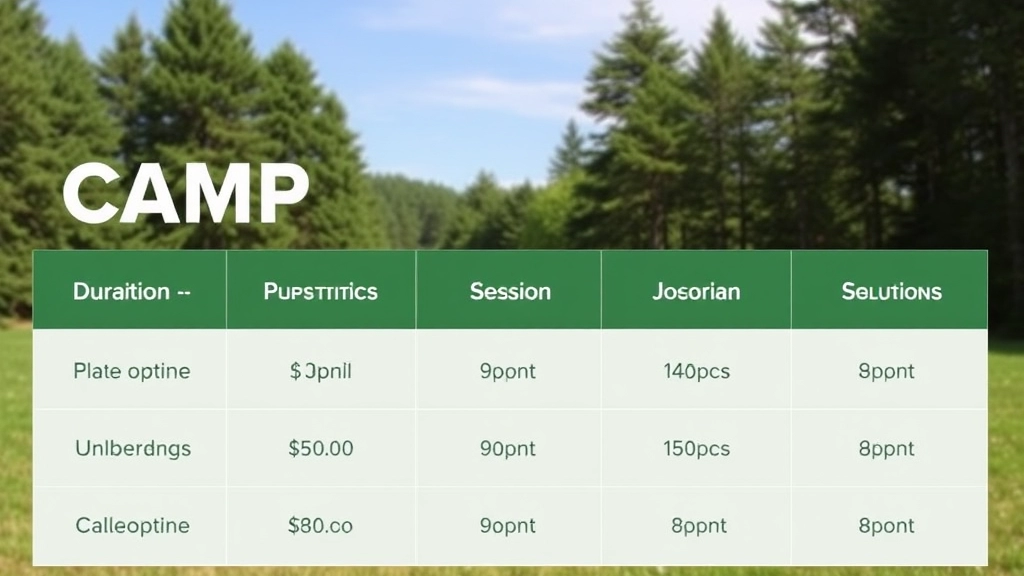
Wondering how long a summer sailing camp lasts?
Not sure which session fits your schedule?
Let’s break it down.
Camp Duration:
Summer sailing camps come in all shapes and sizes.
Some are just a week long.
Others stretch out over the entire summer.
Session Options:
- Weekly Sessions: Perfect for beginners. Dip your toes in the water without committing too much time.
- Bi-weekly Sessions: Ideal for those who want to build on their skills. Two weeks give you more time to learn and practice.
- Monthly Sessions: For the serious sailors. A month-long camp offers deep dives into advanced techniques.
- Full Summer Programs: These are the heavy hitters. Spend the whole summer on the water. By the end, you’ll be a sailing pro.
Why Choose Different Durations?
- Busy Schedule: Got other summer plans? Weekly sessions are flexible.
- Skill Building: Want to improve fast? Longer sessions are your best bet.
- Immersion: Live and breathe sailing. Full summer programs are immersive experiences.
Real Stories:
I remember a kid named Jake.
He started with a weekly session.
Loved it so much, he signed up for the full summer the next year.
By the end, he was leading the pack.
Key Takeaways:
- Flexibility: Choose a duration that fits your life.
- Skill Level: Longer sessions = more skills.
- Immersion: Full summer camps offer the most comprehensive experience.
Costs and Registration Process
Alright, let’s talk about the nitty-gritty: the costs and registration process for summer sailing camps. This is often where parents and guardians start to sweat a bit. How much is this going to set you back, and what hoops do you need to jump through to get your kid signed up?
Understanding the Costs
First off, let’s break down the costs. You might be wondering, “How much does a summer sailing camp cost?” Well, it varies. Here’s a quick rundown:
- Basic Camps: These can run anywhere from £300 to £600 per week. These camps usually cover the essentialsâsailing lessons, basic gear, and maybe a t-shirt or two.
- Intermediate Camps: For something a bit more advanced, expect to pay between £600 and £1,200 per week. These camps often include more specialised training, better equipment, and additional activities.
- Advanced/Elite Camps: If your kid is aiming for the Olympics, you’re looking at £1,200+ per week. These camps offer top-notch coaching, high-end gear, and a more intensive programme.
What’s Included?
When you’re shelling out this kind of money, you want to know what you’re getting. Most camps will cover:
- Accommodation: Whether it’s a tent, dorm, or cabin.
- Meals: Three squares a day, plus snacks.
- Equipment: Boats, life jackets, and other necessary gear.
- Instruction: Qualified coaches and trainers.
- Activities: Beyond sailing, think swimming, games, and maybe even some evening entertainment.
Hidden Costs
Watch out for hidden costs. Some camps might charge extra for:
- Transportation: Getting to and from the camp.
- Specialised Gear: Like wetsuits or advanced sailing equipment.
- Optional Activities: Scuba diving, waterskiing, etc.
Registration Process
Now, onto the registration process. This can be a bit of a maze, but let’s simplify it:
- Research: Start by researching camps that fit your budget and your child’s interests.
- Application: Most camps have an online application form. Fill it out with all the necessary details.
- Deposit: Be prepared to pay a deposit upfront. This can range from £50 to £200, depending on the camp.
- Medical Forms: You’ll likely need to submit medical forms. Make sure to have your child’s health records handy.
- Confirmation: Once everything is submitted, you’ll receive a confirmation email. Keep this for your records.
- Final Payment: The remaining balance is usually due a few weeks before the camp starts.
Pro Tips for Registration
- Early Bird Discounts: Many camps offer discounts if you register early. Keep an eye out for these.
- Payment Plans: Some camps offer payment plans to spread out the cost. This can be a lifesaver.
- Scholarships: Don’t overlook scholarships. Many camps offer financial aid for families in need.
Real Concerns
Now, let’s address some real concerns you might have:
- “What if my kid doesn’t like it?”: Many camps offer trial days or shorter sessions. It’s worth checking out.
- “Is it worth the money?”: Think about the skills and experiences your child will gain. Sailing, teamwork, and leadership are invaluable life skills.
- “How do I know it’s safe?”: Look for camps with good reviews, certified instructors, and solid safety protocols. For more detailed information, you can check out our guide on summer camp costs and what you need to know.
If you’re still unsure about which camp to choose, consider exploring some of the top reviews of summer camps for 2024 to help make your decision easier.
Benefits of Summer Sailing Camps for Kids and Teens
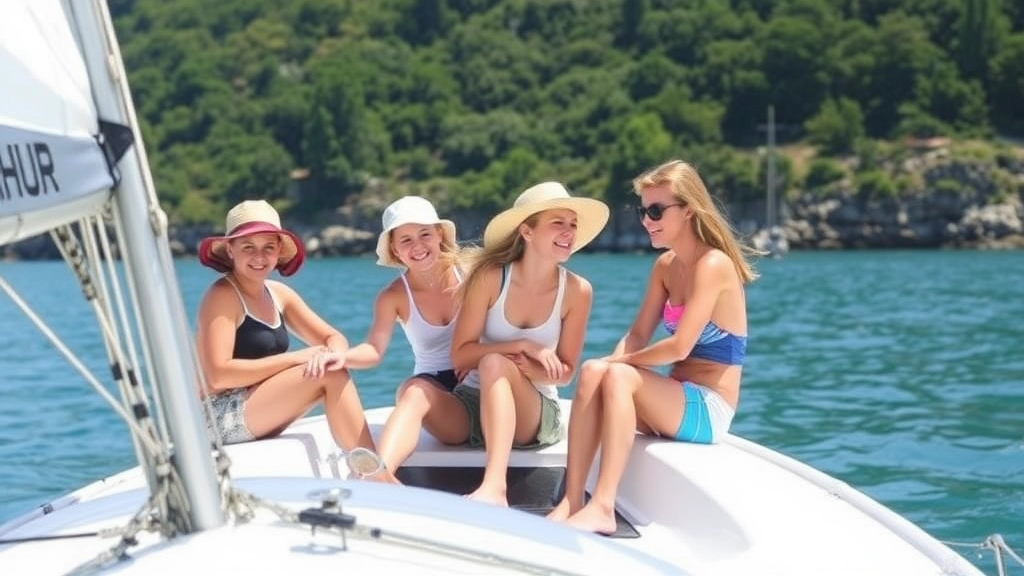
Ever wondered if a summer sailing camp is worth it for your kid or teen?
You’re not alone.
Let’s dive into the benefits, and why it’s more than just a holiday on the water.
Building Confidence and Independence
Keyword: Summer sailing camps
First off, summer sailing camps are a fantastic way to build confidence.
Kids learn to handle a boat solo.
They make real decisions in real-time.
It’s not just about sailing; it’s about growing up.
Physical Fitness
Sailing is a full-body workout.
- Core strength
- Balance
- Coordination
They’re all in play.
And let’s be honest, it beats staring at a screen all summer.
Social Skills and Friendships
Your child will meet peers from all walks of life.
They’ll learn to work as a team.
And those friendships?
They often last a lifetime.
Learning Practical Skills
From tying knots to reading the wind, these are skills that stick.
Plus, they’ll get a taste of marine biology and navigation.
It’s education wrapped in adventure.
Stress Relief and Mental Health
Being out on the water is calming.
It’s a break from the usual hustle.
Kids come back refreshed, with a clearer mind.
Leadership and Responsibility
Handling a boat teaches leadership.
They’ll take charge.
Make decisions.
And learn the weight of responsibility.
Safety First
Worried about safety?
Don’t be.
Keyword: Safety and supervision
These camps have top-notch safety protocols.
Supervision is tight, and instructors are pros.
Real Stories, Real Impact
Take Sarah, for example.
She was shy, always sticking to herself.
After a summer sailing camp?
She came back brimming with confidence.
Her mum couldn’t believe the transformation.
Choosing the Right Camp Based on Interests and Goals
Alright, so you’re thinking about sending your kid to a summer sailing camp but you’re not quite sure how to pick the right one. Trust me, you’re not alone. This is a big decision, and you want to make sure it’s the perfect fit for your child. Let’s break it down.
What Are Your Child’s Interests?
First off, what does your child love doing? Are they all about sailing, or are they more into marine biology or watersports? Here’s what you need to consider:
- Passion for Sailing: If they can’t get enough of being on the water, you’ll want a camp that focuses heavily on sailing skills and offers various levels of expertise.
- Marine Biology Enthusiast: Maybe your kid is fascinated by sea creatures and ecosystems. Look for camps that offer educational programs in marine biology.
- Adventure Seeker: Some kids are adrenaline junkies who love scuba diving, kayaking, or other watersports. Make sure the camp offers these additional activities.
Setting Goals
Ask yourself, what do you want your child to get out of this experience? Here are a few goals you might have in mind:
- Skill Development: If the aim is to improve sailing skills, look for camps with structured skill levels and certification programs.
- Making Friends: Social interaction is crucial. A camp with a strong community vibe and team-building activities can be a great choice.
- Building Confidence: Camps that focus on leadership and teamwork can help boost your child’s self-esteem and independence.
Location, Location, Location
Where the camp is located can make a huge difference. Consider these factors:
- Proximity: Is the camp close to home, or are you okay with it being further away? Some parents prefer nearby locations for peace of mind.
- Sailing Environment: Different locations offer different sailing conditions. Do you want a camp by the ocean, a lake, or a river?
- Climate: The weather can affect the overall experience. Make sure the climate is suitable for your child.
Safety First
Safety is non-negotiable. Look into:
- Supervision: How many staff members are there per camper? More supervision generally means better safety.
- Emergency Plans: Does the camp have a solid emergency plan? Are the staff trained in first aid and CPR?
- Equipment: Is the sailing equipment well-maintained and up-to-date?
Testimonials and Reviews
Don’t just take the camp’s word for it. Hear from other parents and kids who have been there. Check online reviews and testimonials to get a real sense of what the camp is like.
Costs and Budget
Let’s be real, costs matter. Sailing camps can range from affordable to pretty pricey. Make sure you:
- Compare Prices: Look at what different camps offer for the price.
- Check What’s Included: Sometimes a higher fee covers more activities, meals, and equipment.
- Ask About Scholarships: Some camps offer financial aid or scholarships.
Making the Final Decision
When you’ve narrowed it down, sit down with your child and discuss the options. Their input is crucial because, at the end of the day, it’s their experience.
If you’re looking for a camp with a strong focus on marine biology, check out our Hawaii Summer Camps for an enriching experience. For those interested in leadership and teamwork, our Essential Guide for Summer Camp Leaders can provide valuable insights.
Preparing for Camp: What to Pack
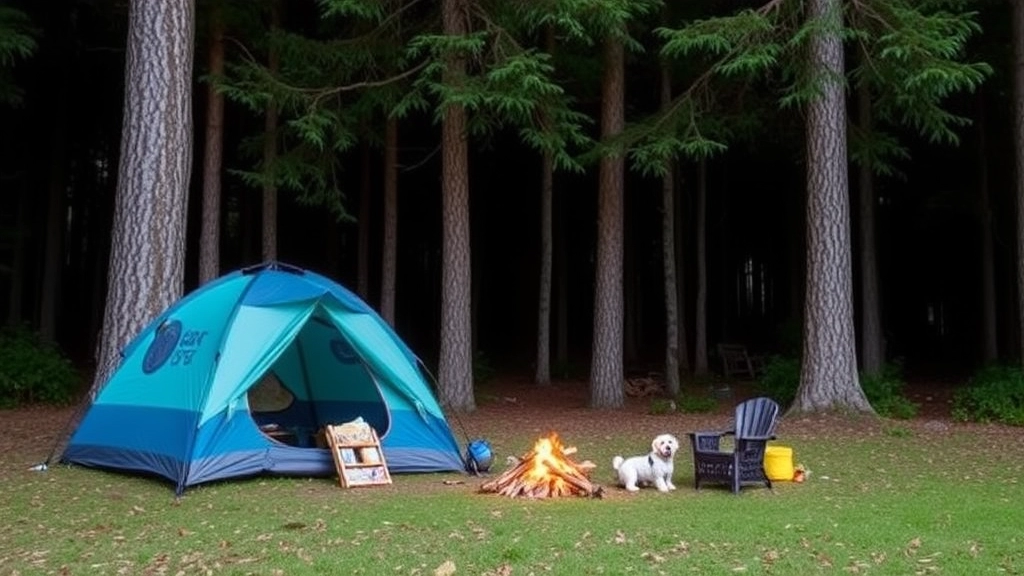
Alright, so you’re gearing up for a summer sailing camp.
Excited, right?
But then you realise, what do you actually need to pack?
No worries, I’ve got you covered.
Let’s break it down.
The Essentials
First things first, you need the essentials.
These are non-negotiable, must-haves for any sailing camp.
- Life Jacket: Safety first, always.
- Swimwear: Pack a couple of these. You’ll be in and out of the water all day.
- Sunscreen: Trust me, you don’t want to deal with sunburn.
- Hat and Sunglasses: Protect your face and eyes from the sun’s glare.
- Water Shoes: These are great for walking on rocky shores.
Clothing
You’ll need the right clothes to stay comfortable and safe.
- Quick-Dry T-Shirts and Shorts: You’ll get wet, so quick-dry is key.
- Lightweight Jacket: Evenings can get chilly on the water.
- Waterproof Gear: Just in case it rains.
- Comfortable Trainers: For any land-based activities.
Personal Items
Don’t forget your personal items. These can make or break your camp experience.
- Toiletries: Toothbrush, toothpaste, shampoo, soap. You know the drill.
- Towel: A quick-dry one is ideal.
- Medications: If you take any, don’t forget these.
- Reusable Water Bottle: Staying hydrated is crucial.
- Snacks: Because who doesn’t get hungry?
Tech and Gadgets
You might want to stay connected or capture memories.
- Phone and Charger: For emergencies and photos.
- Camera: If you’re into photography.
- Portable Charger: Always handy.
Fun Stuff
You’re at camp to have fun, after all.
- Books or Magazines: For some downtime.
- Games: Card games or small board games can be a hit.
- Journal: To jot down your adventures.
Real Talk
Now, a quick story.
I once forgot my hat and sunglasses on a sailing trip.
Big mistake.
I ended up squinting all day and got a nasty headache.
Don’t be like me.
Pack smart.
Final Check
Before you zip up that suitcase, do a final check.
Make sure you’ve got everything you need.
Trust me, it makes all the difference.
And there you have it.
Your ultimate packing list for summer sailing camp.
Ready to hit the waves?
I bet you are.
Happy sailing!
Alumni Experiences and Testimonials
Thinking about sending your kid to a summer sailing camp but not sure if it’s worth it?
I get it.
It’s a big decision.
Let’s dive into some real alumni experiences and testimonials to give you a clearer picture.
Real Stories from Real People
Jane, Mum of a 12-year-old Sailor:
“When we first considered a summer sailing camp, we were worried about safety and whether our daughter would actually enjoy it. But after hearing from other parents, we took the plunge. Best decision ever. She came back with newfound confidence and a love for the sea.”
Tom, 15-year-old Alumni:
“I was sceptical at first. I mean, sailing? Really? But the camp was a blast. I made friends for life, learned so much about marine biology, and even got certified in basic navigation. It was an adventure I’ll never forget.”
What Alumni Loved About the Camp
- Skill Development: From beginners to advanced sailors, everyone felt they learned something new.
- Friendship: The camaraderie was off the charts. Many alumni still keep in touch.
- Confidence: Tackling the sea boosted their self-esteem like nothing else.
Concerns Addressed
- Safety: Almost every testimonial highlighted the excellent safety measures in place.
- Learning Curve: Even those who had never set foot on a boat before found the learning pace manageable and fun.
Why It’s Worth It
- Life Skills: Beyond sailing, alumni often mention how the camp taught them leadership and teamwork.
- Memories: The stories shared are filled with unforgettable moments and personal growth.
- Future Opportunities: Some even pursued marine studies or careers in sailing after their camp experience.
Still on the fence?
Alumni experiences show that summer sailing camps offer more than just a fun time on the water.
They provide life-changing experiences.
So, if you’re looking for something that can boost your kid’s confidence, teach them valuable skills, and give them memories to last a lifetime, a summer sailing camp might just be the ticket.
Got any questions or want to hear more stories?
Feel free to reach out.
Your kid’s next big adventure could be just around the corner.
For more tips on keeping your camper cool during summer, check out our Top Tips to Keep Your Camper Cool in Summer.
And if you’re curious about other unique camp experiences, explore our guide on Common Ground Summer Camp.
Frequently Asked Questions about Summer Sailing Camp
Who can join a summer sailing camp?
Sailing camps are generally open to a wide range of age groups, from young children to teenagers. Specific age brackets typically include kids aged 7-12 and teens aged 13-17.
What age groups are the camps designed for?
There are usually two main age brackets:
- Kids (7-12 years): Focus on basic sailing skills and fun activities.
- Teens (13-17 years): More advanced lessons with opportunities for leadership roles.
Are there any eligibility criteria to join?
Yes, most camps require:
- Basic swimming skills
- Medical clearance
- Parental consent
What skill levels do the camps accommodate?
Camps cater to all skill levels, from beginners to advanced sailors. Specific programs include:
- Beginners: Basics like tying knots and handling a boat.
- Intermediate: More advanced techniques and navigation skills.
- Advanced: Competitive sailing and advanced navigation.
Are there certification programs available?
Yes, many camps offer certifications such as:
- Royal Yachting Association (RYA) Certifications: Recognised globally, including RYA Start Sailing, RYA Competent Crew, and RYA Day Skipper.
- US Sailing Certifications: Include Basic Keelboat, Cruising Courses, and Racing Courses.
What educational aspects are covered?
Camps often include lessons in marine biology and navigation. Kids learn about marine ecosystems, species identification, and navigation skills like reading charts and using a compass.
How do camps ensure safety and supervision?
Safety is a top priority, with measures such as:
- Certified instructors
- Life jackets and regularly checked gear
- Constant supervision
- Emergency protocols
What are the typical durations and session options for camps?
Camps vary in duration, including:
- Weekly sessions
- Bi-weekly sessions
- Monthly sessions
- Full summer programs
What are the benefits of attending a summer sailing camp?
Benefits include:
- Building confidence and independence
- Physical fitness
- Social skills and friendships
- Learning practical skills
- Stress relief and mental health
- Leadership and responsibility
What should my child pack for camp?
Essential items to pack include:
- Life jacket
- Swimwear
- Sunscreen
- Hat and sunglasses
- Water shoes
- Quick-dry clothing
- Personal items like toiletries and medications
- Tech and gadgets (optional)
- Fun items like books or games

